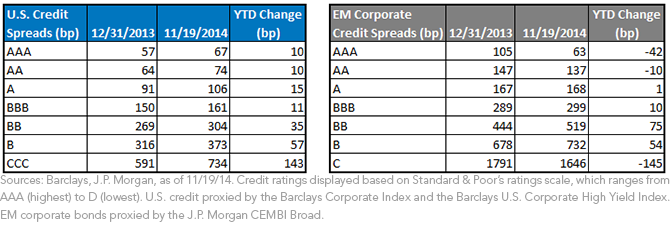Navigating Credit Cycles with Actively Managed ETFs


 Click for definition of credit ratings.
As we show in the tables above, credit spreads have generally widened so far this year. However, the market’s perception of high-credit quality borrowers in emerging markets has actually improved, decreasing credit spreads. Additionally, BBB-rated credits have outperformed A-rated credits in the U.S. Due to a variety of factors, credit may not always be priced in a linear fashion. This is precisely why WisdomTree chose to partner with Western Asset Management Company (“Western”) to launch actively managed corporate bond strategies. As part of its investment process, Western relies on teams of analysts that seek to identify the risks ultimately worth taking in a portfolio. As a result, it may be possible to exploit these divergences in pricing or avoid the pitfalls of agnostic credit investing, all in a transparent structure.
Ultimately, the underlying approaches to portfolio management in actively managed ETFs are largely the same approaches that many managers have historically employed in other investment wrappers. In the case of ETFs, portfolio turnover may tend to be lower, and the portfolio may skew toward more liquid securities in certain instances, but the overall DNA remains intact.
Through our partnership with Western, we have packaged two distinct approaches to active portfolio management in corporate bonds: the WisdomTree Strategic Corporate Bond Fund (CRDT) and the WisdomTree Emerging Markets Corporate Bond Fund (EMCB). CRDT provides a broad-based approach to corporate bond investments, strategically investing in corporate bonds across the credit spectrum and across the world. EMCB takes a more targeted approach, investing in one of the world’s fastest-growing bond markets, U.S. dollar-denominated bonds issued by EM corporations. Both processes integrate top-down macro analysis with bottom-up fundamental credit analysis.
While the debate over approaches to active management will undoubtedly continue to rage, we believe that transparency is one of the core characteristics advisors look for when investing in ETFs. In our view, the ETF’s daily transparency provides investors with valuable information to help manage risk across their portfolio.
Click for definition of credit ratings.
As we show in the tables above, credit spreads have generally widened so far this year. However, the market’s perception of high-credit quality borrowers in emerging markets has actually improved, decreasing credit spreads. Additionally, BBB-rated credits have outperformed A-rated credits in the U.S. Due to a variety of factors, credit may not always be priced in a linear fashion. This is precisely why WisdomTree chose to partner with Western Asset Management Company (“Western”) to launch actively managed corporate bond strategies. As part of its investment process, Western relies on teams of analysts that seek to identify the risks ultimately worth taking in a portfolio. As a result, it may be possible to exploit these divergences in pricing or avoid the pitfalls of agnostic credit investing, all in a transparent structure.
Ultimately, the underlying approaches to portfolio management in actively managed ETFs are largely the same approaches that many managers have historically employed in other investment wrappers. In the case of ETFs, portfolio turnover may tend to be lower, and the portfolio may skew toward more liquid securities in certain instances, but the overall DNA remains intact.
Through our partnership with Western, we have packaged two distinct approaches to active portfolio management in corporate bonds: the WisdomTree Strategic Corporate Bond Fund (CRDT) and the WisdomTree Emerging Markets Corporate Bond Fund (EMCB). CRDT provides a broad-based approach to corporate bond investments, strategically investing in corporate bonds across the credit spectrum and across the world. EMCB takes a more targeted approach, investing in one of the world’s fastest-growing bond markets, U.S. dollar-denominated bonds issued by EM corporations. Both processes integrate top-down macro analysis with bottom-up fundamental credit analysis.
While the debate over approaches to active management will undoubtedly continue to rage, we believe that transparency is one of the core characteristics advisors look for when investing in ETFs. In our view, the ETF’s daily transparency provides investors with valuable information to help manage risk across their portfolio.Important Risks Related to this Article
Foreign investing involves special risks, such as risk of loss from currency fluctuation or political or economic uncertainty. Investments in emerging, offshore or frontier markets are generally less liquid and less efficient than investments in developed markets and are subject to additional risks, such as risks of adverse governmental regulation and intervention or political developments. Derivative investments can be volatile, and these investments may be less liquid than other securities, and more sensitive to the effects of varied economic conditions. Fixed income investments are subject to interest rate risk; their value will normally decline as interest rates rise. In addition, when interest rates fall, income may decline. Fixed income investments are also subject to credit risk, the risk that the issuer of a bond will fail to pay interest and principal in a timely manner, or that negative perceptions of the issuer’s ability to make such payments will cause the price of that bond to decline. Unlike typical exchange-traded funds, there is no index that these Funds attempt to track or replicate. Thus, the ability of the Funds to achieve their objective will depend on the effectiveness of the portfolio manager. Please read each Fund’s prospectus for specific details regarding each Fund’s risk profile. Western Asset Management is not affiliated with ALPS Distributors, Inc.

Rick Harper serves as the Chief Investment Officer, Fixed Income and Model Portfolios at WisdomTree Asset Management, where he oversees the firm’s suite of fixed income and currency exchange-traded funds. He is also a voting member of the WisdomTree Model Portfolio Investment Committee and takes a leading role in the management and oversight of the fixed income model allocations. He plays an active role in risk management and oversight within the firm.
Rick has over 29 years investment experience in strategy and portfolio management positions at prominent investment firms. Prior to joining WisdomTree in 2007, Rick held senior level strategist roles with RBC Dain Rauscher, Bank One Capital Markets, ETF Advisors, and Nuveen Investments. At ETF Advisors, he was the portfolio manager and developer of some of the first fixed income exchange-traded funds. His research has been featured in leading periodicals including the Journal of Portfolio Management and the Journal of Indexes. He graduated from Emory University and earned his MBA at Indiana University.

